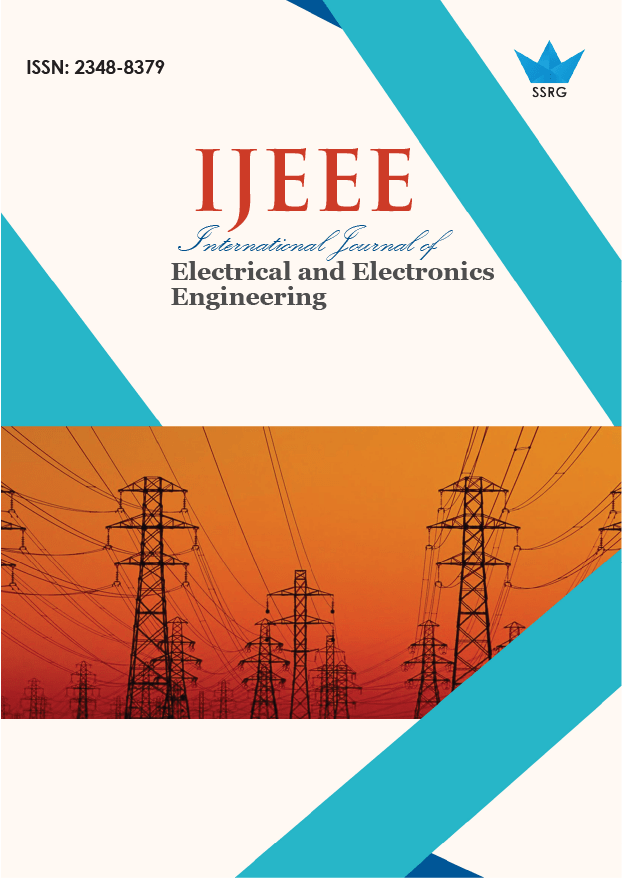Optimizing Electric Vehicle Charging Infrastructure through Hybrid Machine Learning Techniques for Smart Energy Management

| International Journal of Electrical and Electronics Engineering |
| © 2024 by SSRG - IJEEE Journal |
| Volume 11 Issue 7 |
| Year of Publication : 2024 |
| Authors : N.S. Usha, K. Sudharson, S. Gunasundari, R. Vanitha |
How to Cite?
N.S. Usha, K. Sudharson, S. Gunasundari, R. Vanitha, "Optimizing Electric Vehicle Charging Infrastructure through Hybrid Machine Learning Techniques for Smart Energy Management," SSRG International Journal of Electrical and Electronics Engineering, vol. 11, no. 7, pp. 148-158, 2024. Crossref, https://doi.org/10.14445/23488379/IJEEE-V11I7P112
Abstract:
As the world begins to move more and more towards Electric Vehicles (EVs), the imperative for innovative solutions to streamline energy management within charging infrastructure intensifies. This study delves into the realm of machine learning integration, focusing particularly on Random Forest (RF) techniques to revolutionize energy optimization in EV charging systems. While Gradient Boosting Machine (GBM) initially garners attention for its adeptness with intricate datasets, RF emerges as a potent complementary approach uniquely suited to handle the complexities of nonlinear relationships. By synergizing the strengths of RF and GBM algorithms, this research endeavors to dynamically refine charging schedules, curtail costs, and fortify grid stability. Through a fusion of historical data and real-time environmental factors, the envisioned “Adaptive Ensemble Learning Framework” (AELF)-driven smart charging infrastructure is primed to recalibrate charging strategies in response to energy demand fluctuations while judiciously balancing user preferences and grid constraints. Rigorous simulations and case studies serve as the litmus test, pitting the efficacy of the AELF approach against the conventional Decision Trees Model and Support Vector Machines Technique. The results tout enhancements of up to 15% across diverse performance metrics, underscoring its prowess in charting the course towards a sustainable and intelligent transportation ecosystem.
Keywords:
Electric vehicles, Hybrid machine learning, Random forest, Smart charging infrastructure, Energy optimization.
References:
[1] Moin Ahmed et al., “The Role of Artificial Intelligence in the Mass Adoption of Electric Vehicles,” Joule, vol. 5, no. 9, pp. 2296-2322, 2021.
[CrossRef] [Google Scholar] [Publisher Link]
[2] Sahar Koohfar, Wubeshet Woldemariam, and Amit Kumar, “Prediction of Electric Vehicles Charging Demand: A Transformer-Based Deep Learning Approach,” Sustainability, vol. 15, no. 3, pp. 1-17, 2023.
[CrossRef] [Google Scholar] [Publisher Link]
[3] Yunsun Kim, and Sahm Kim, “Forecasting Charging Demand of Electric Vehicles Using Time-Series Models,” Energies, vol. 14, no. 5, pp. 1-16, 2021.
[CrossRef] [Google Scholar] [Publisher Link]
[4] Yiyan Liu et al., “Electric Vehicle Charging Demand Prediction Based on Traffic Flow Volume and Fuzzy Reasoning,” SSRN, pp. 1-12, 2024.
[CrossRef] [Google Scholar] [Publisher Link]
[5] Adrian Ostermann, and Theodor Haug, “Probabilistic Forecast of Electric Vehicle Charging Demand: Analysis of Different Aggregation Levels and Energy Procurement,” Energy Informatics, vol. 7, pp. 1-25, 2024.
[CrossRef] [Google Scholar] [Publisher Link]
[6] Zhiyan Yi et al., “Electric Vehicle Charging Demand Forecasting Using Deep Learning Model,” Journal of Intelligent Transportation Systems, vol. 26, no. 6, pp. 690-703, 2021.
[CrossRef] [Google Scholar] [Publisher Link]
[7] Harshit Rathore, Hemant Kumar Meena, and Prerna Jain, “Prediction of EV Energy Consumption Using Random Forest and XGBoost,” 2023 International Conference on Power Electronics and Energy (ICPEE), Bhubaneswar, India, pp. 1-6, 2023.
[CrossRef] [Google Scholar] [Publisher Link]
[8] Roya Aghsaee et al., “Data-Driven, Short-Term Prediction of Charging Station Occupation,” Electricity, vol. 4, no. 2, pp. 134-153, 2023.
[CrossRef] [Google Scholar] [Publisher Link]
[9] Nicholas Jeffrey, Qing Tan, and Jose R. Villar, “A Review of Anomaly Detection Strategies to Detect Threats to Cyber-Physical Systems,” Electronics, vol. 12, no. 15, pp. 1-34, 2023.
[CrossRef] [Google Scholar] [Publisher Link]
[10] Zhaosheng Zhang et al., “Prediction and Diagnosis of Electric Vehicle Battery Fault Based on Abnormal Voltage: Using Decision Tree Algorithm Theories and Isolated Forest,” Processes, vol. 12, no. 1, 1-19, 2024.
[CrossRef] [Google Scholar] [Publisher Link]
[11] Rui Xiong et al., “Critical Review on the Battery State of Charge Estimation Methods for Electric Vehicles,” IEEE Access, vol. 6, pp. 1832-1843, 2018.
[CrossRef] [Google Scholar] [Publisher Link]
[12] Giacomo Falchetta, and Michel Noussan, “Electric Vehicle Charging Network in Europe: An Accessibility and Deployment Trends Analysis,” Transportation Research Part D: Transport and Environment, vol. 94, 2021.
[CrossRef] [Google Scholar] [Publisher Link]
[13] Csaba Csiszar et al., “Location Optimisation Method for Fast-Charging Stations along National Roads,” Journal of Transport Geography, vol. 88, 2020.
[CrossRef] [Google Scholar] [Publisher Link]
[14] Abir Smiti, “A Critical Overview of Outlier Detection Methods,” Computer Science Review, vol. 38, 2020.
[CrossRef] [Google Scholar] [Publisher Link]
[15] Patricio Cerda, Gael Varoquaux, and Balazs Kegl, “Similarity Encoding for Learning with Dirty Categorical Variables,” Machine Learning, vol. 107, pp. 1477-1494, 2018.
[CrossRef] [Google Scholar] [Publisher Link]
[16] Gi-Wook Cha, Hyeun-Jun Moon, and Young-Chan Kim, “Comparison of Random Forest and Gradient Boosting Machine Models for Predicting Demolition Waste Based on Small Datasets and Categorical Variables,” International Journal of Environmental Research and Public Health, vol. 18, no. 16, pp. 1-16, 2021.
[CrossRef] [Google Scholar] [Publisher Link]
[17] Sakib Shahriar et al., “Prediction of EV Charging Behavior Using Machine Learning,” IEEE Access, vol. 9, pp. 111576-111586, 2021.
[CrossRef] [Google Scholar] [Publisher Link]
[18] Patrick Schratz et al., “Hyperparameter Tuning and Performance Assessment of Statistical and Machine-Learning Algorithms Using Spatial Data,” Ecological Modelling, vol. 406, pp. 109-120, 2019.
[CrossRef] [Google Scholar] [Publisher Link]
[19] Md. Rayid Hasan Mojumder et al., “Electric Vehicle-to-Grid (V2G) Technologies: Impact on the Power Grid and Battery,” Sustainability, vol. 14, no. 21, pp. 1-53, 2022.
[CrossRef] [Google Scholar] [Publisher Link]
[20] Robert J. Flores, Brendan P. Shaffer, and Jacob Brouwer, “Electricity Costs for an Electric Vehicle Fueling Station with Level 3 Charging,” Applied Energy, vol. 169, pp. 813-830, 2016.
[CrossRef] [Google Scholar] [Publisher Link]

 10.14445/23488379/IJEEE-V11I7P112
10.14445/23488379/IJEEE-V11I7P112